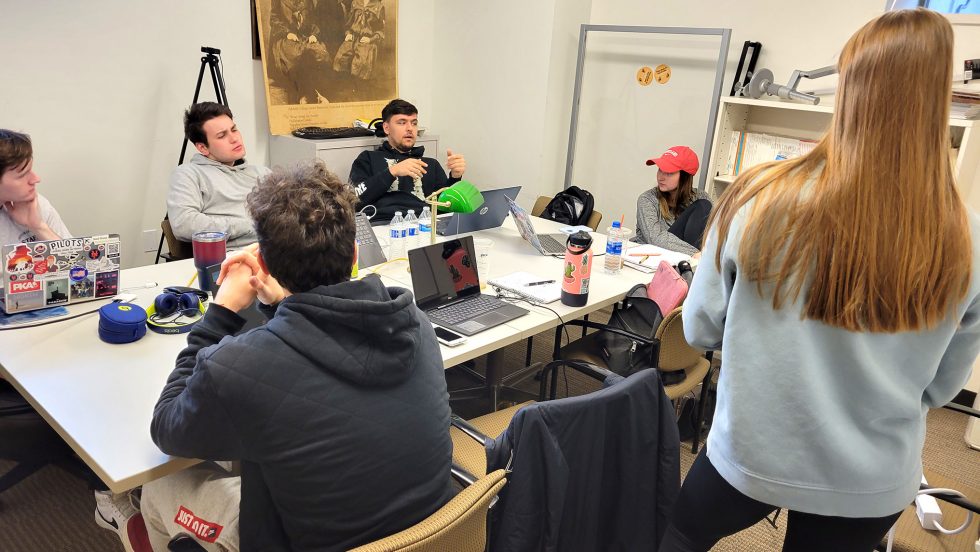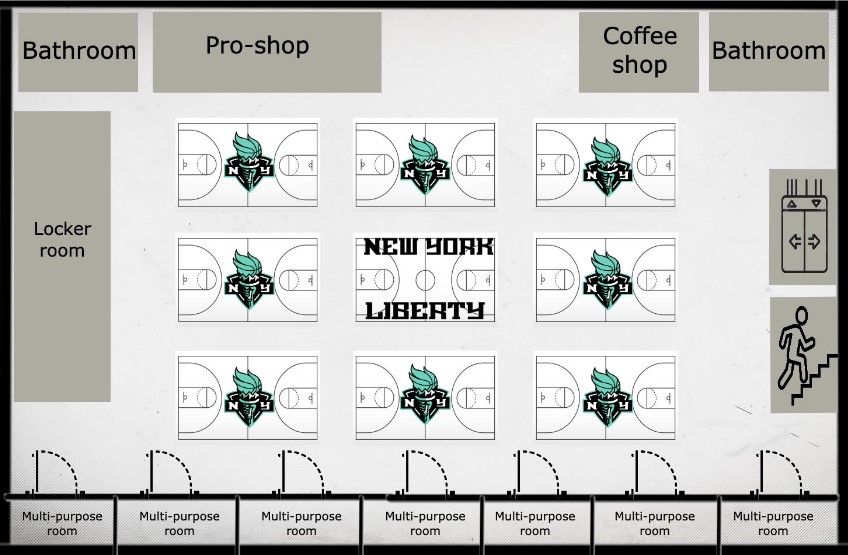
Early on the morning of April 10, seven Adelphi students gathered in the Woodruff Hall conference room to finalize their vision for a reimagined community center that was environmentally sustainable, profitable and accessible to typically underserved communities.
The team—graduate students Nicole Chadwick and Edwin Chinyemba, undergraduate student Sevar Glavchovski, and recent graduates Daniel Fitzsimmons ’22, Sarah Hofmeier ’22, Alek Kadziolka ’22 and Edward (Ned) Shaw ’22—were entering their final day of the SportsPro Hackathon, an international sport management competition.
Unlike computer hackathons where participants deliver a code-based project, the SportsPro Hackathon challenges students to “hack” ways to make the sport industry friendlier to the environment. Team Panthers competed against teams from Columbia University, the FIFA Master Program, and schools in Denmark, the United Kingdom and other European countries.
The team’s project was called the New York Liberty Community Center. The imagined venue featured three indoor soccer pitches, nine basketball courts and a suite of supporting facilities made sustainable by solar panels, LED lights and kinetic floor tiles.
Team Panthers was one of 20 teams from 10 universities around the world given less than 48 hours to come up with ideas to get more people involved in sports while also helping the planet. Students had to design solutions for communities facing barriers to equity in sports. At the same time, they needed to find ways to increase energy efficiency, reduce waste or otherwise minimize the building’s impact on the environment. Teams had to be sure the project made financial sense too.
A Global Collaboration
The students received their challenge on Friday afternoon. They immediately jumped into action, assigning tasks for everyone to complete by the Sunday afternoon deadline.
After working into Friday night and all day Saturday, they met for the last time bright and early Sunday morning to finish the video presentation for the community center.
Despite the intensity of the project, no faculty were allowed to help with the challenge. “The project was student-led from the start,” said Greg Bouris, director of the undergraduate sport management program who first got Adelphi involved in the hackathon. “It’s an opportunity for them to understand the real-world pressures of our industry.”
Instead, Team Panthers met virtually with sport industry leaders from around the world for mentorship, and networked on a global basis with their sport management student peers, forming connections to last into their professional careers.
After an intense weekend of both collaborative and independent work, Team Panthers submitted their PowerPoint and supporting video presentations for New York Liberty Community Center.
The proposal included floor plans for the three-story venue as well as strategies for financial sponsorships to fund the center. Keeping the surrounding community in mind too, the Adelphi students came up with solutions like a youth employment program and shared rooftop garden to get people involved in the center.

Part of the floor plan for New York Liberty Community Center proposed by Team Panthers during the SportsPro Hackathon.
Real-World Experience in Sport Management
Bouris assembled Team Panthers with the help of other sport management faculty. Students were nominated based on their academic standing, leadership and extracurricular involvement in the program.
Though Team Panthers didn’t place, students found the intense competition to be a great way to collaborate and bond with their peers. Bouris sees it as excellent career preparation too. “The hackathon is a real confidence boost to our seniors and grad students,” he said. “They’re able to get out of their comfort zone and into a real-world, deadline-driven environment.”